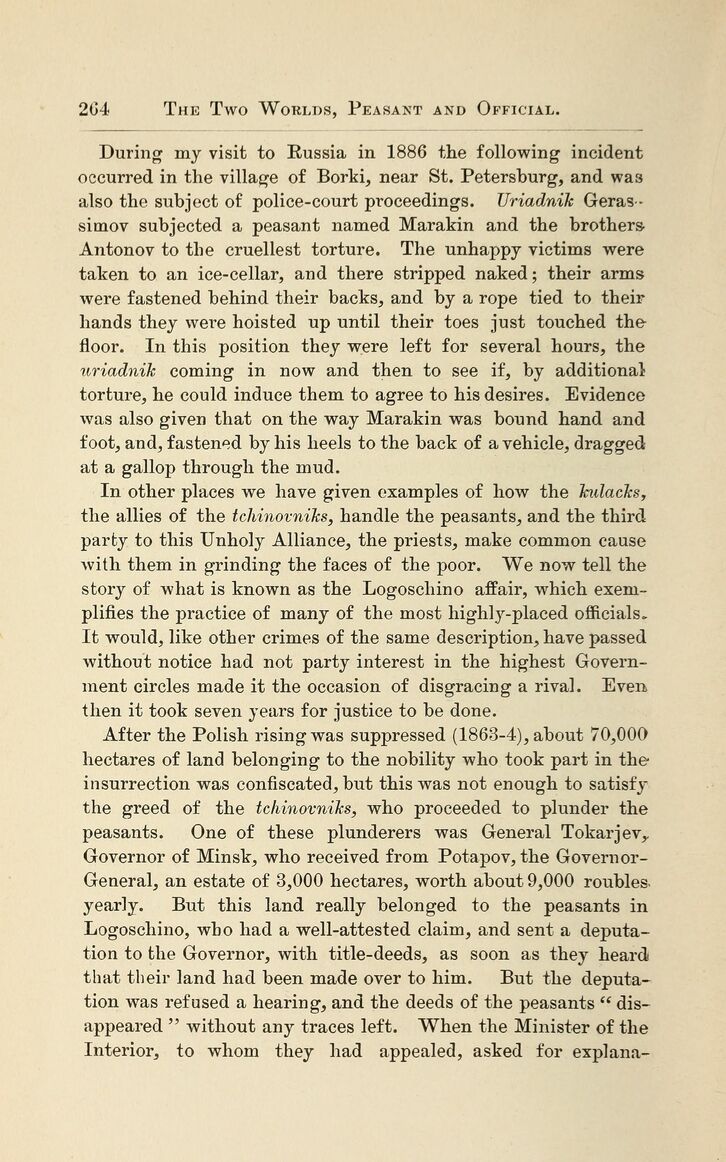
Full resolution (JPEG) - On this page / på denna sida - XVI. The two Worlds, Peasant and Official

<< prev. page << föreg. sida << >> nästa sida >> next page >>
Below is the raw OCR text
from the above scanned image.
Do you see an error? Proofread the page now!
Här nedan syns maskintolkade texten från faksimilbilden ovan.
Ser du något fel? Korrekturläs sidan nu!
This page has been proofread at least once.
(diff)
(history)
Denna sida har korrekturlästs minst en gång.
(skillnad)
(historik)
During my visit to Russia in 1886 the following incident
occurred in the village of Borki, near St. Petersburg, and was
also the subject of police-court proceedings. Uriadnik
Gerassimov subjected a peasant named Marakin and the brothers
Antonov to the cruellest torture. The unhappy victims were
taken to an ice-cellar, and there stripped naked; their arms
were fastened behind their backs, and by a rope tied to their
hands they were hoisted up until their toes just touched the
floor. In this position they were left for several hours, the
uriadnik coming in now and then to see if, by additional
torture, he could induce them to agree to his desires. Evidence
was also given that on the way Marakin was bound hand and
foot, and, fastened by his heels to the back of a vehicle, dragged
at a gallop through the mud.
In other places we have given examples of how the kulacks,
the allies of the tchinovniks, handle the peasants, and the third
party to this Unholy Alliance, the priests, make common cause
with them in grinding the faces of the poor. We now tell the
story of what is known as the Logoschino affair, which
exemplifies the practice of many of the most highly-placed officials.
It would, like other crimes of the same description, have passed
without notice had not party interest in the highest
Government circles made it the occasion of disgracing a rival. Even
then it took seven years for justice to be done.
After the Polish rising was suppressed (1863-4), about 70,000
hectares of land belonging to the nobility who took part in the
insurrection was confiscated, but this was not enough to satisfy
the greed of the tchinovniks, who proceeded to plunder the
peasants. One of these plunderers was General Tokarjev,
Governor of Minsk, who received from Potapov, the
Governor-General, an estate of 3,000 hectares, worth about 9,000 roubles
yearly. But this land really belonged to the peasants in
Logoschino, who had a well-attested claim, and sent a
deputation to the Governor, with title-deeds, as soon as they heard
that their land had been made over to him. But the
deputation was refused a hearing, and the deeds of the peasants
“disappeared” without any traces left. When the Minister of the
Interior, to whom they had appealed, asked for
<< prev. page << föreg. sida << >> nästa sida >> next page >>